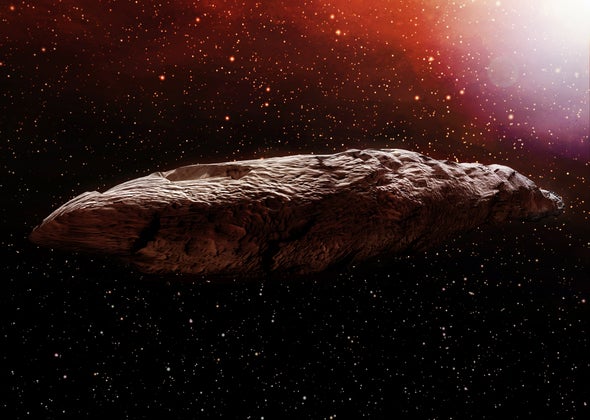
A 3D illustration of the interstellar object known as ‘Oumuamua. Credit: Getty Images
Topics: Astrophysics, Space Exploration, Spaceflight
‘Oumuamua—a mysterious, interstellar object that crashed through our solar system two years ago—might, in fact, be alien technology. That’s because an alternative, non-alien explanation might be fatally flawed, as a new study argues.
But most scientists think the idea that we spotted alien technology in our solar system is a long shot.
In 2018, our solar system ran into an object lost in interstellar space. The object, dubbed ‘Oumuamua, seemed to be long and thin—cigar-shaped—and tumbling end over end. Then, close observations showed it was accelerating as if something were pushing on it. Scientists still aren’t sure why.
One explanation? The object was propelled by an alien machine, such as a lightsail—a wide, millimeter-thin machine that accelerates as it’s pushed by solar radiation. The main proponent of this argument was Avi Loeb, a Harvard University astrophysicist.
Most scientists, however, think ‘Oumuamua’s wonky acceleration was likely due to a natural phenomenon. In June, a research team proposed that solid hydrogen was blasting invisibly off the interstellar object’s surface and causing it to speed up.
Now, in a new paper published Monday (Aug. 17) in The Astrophysical Journal Letters, Loeb and Thiem Hoang, an astrophysicist at the Korea Astronomy and Space Science Institute, argue that the hydrogen hypothesis couldn’t work in the real world—which would mean that there is still hope that our neck of space was once visited by advanced aliens—and that we actually spotted their presence at the time.
Here’s the problem with ‘Oumuamua: It moved like a comet, but didn’t have the classic coma, or tail, of a comet, said astrophysicist Darryl Seligman, an author of the solid hydrogen hypothesis, who is starting a postdoctoral fellowship in astrophysics at the University of Chicago.
Mystery of Interstellar Visitor ‘Oumuamua Gets Trickier, Rafi Letzter, Live Science, Scientific American
Comments